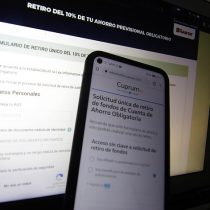
The migrant population in Chile blamed problems with the pension withdrawal process and pointed to identity card as the main factor.
“The legislation is being violated here as the Superintendency (of Pensions) pointed out that 10 percent could be done with expired cards, which is not being done today,” accused Héctor Pujols, president of the Social Coordinator of Migrants, according to Radio Cooperativa.
Pujols noted that the vast majority of the migrant population could not access any kind of bond or benefit that was implemented. “Many migrants have lost their jobs and therefore this 10 percent is vital to be able to eat today. It has been said that we were going to buy TVs or how many (other) things; people need it to be able to survive, and they are breaking the legislation,” he said.
In view of these difficulties, the AFP Modelo enabled a special website (www.tu10conmodelocedulavencia.cl) so that migrants with problems in their identity card can carry out the procedure without the need to attend branches in person.
On the other hand, groups of Chileans abroad or people who listed for a time in Chile and today live abroad also pointed out difficulties and complexity in the process for their cases.
Victor Hugo Sáez, of the European Network of Chileans, told the radio that “so far the only solution that the Superintendency has given is a long and farging road through a double working system in the consulates”.
“Basically it consists of carrying a form that will have a minimum value of 7 euros, which must be paid at the Consulate, then couriered to Chile to a third person, who has to approach the AFP doing the queues that we watch on television with all the risk of the pandemic,” he added.
It should be mentioned that the Superintendency is working with the Chancellery because many Chileans have gone to consulates to consult on the process, and it is expected that in the coming days there will be announcements and eventually the regulated one issues an office with new guidelines.





